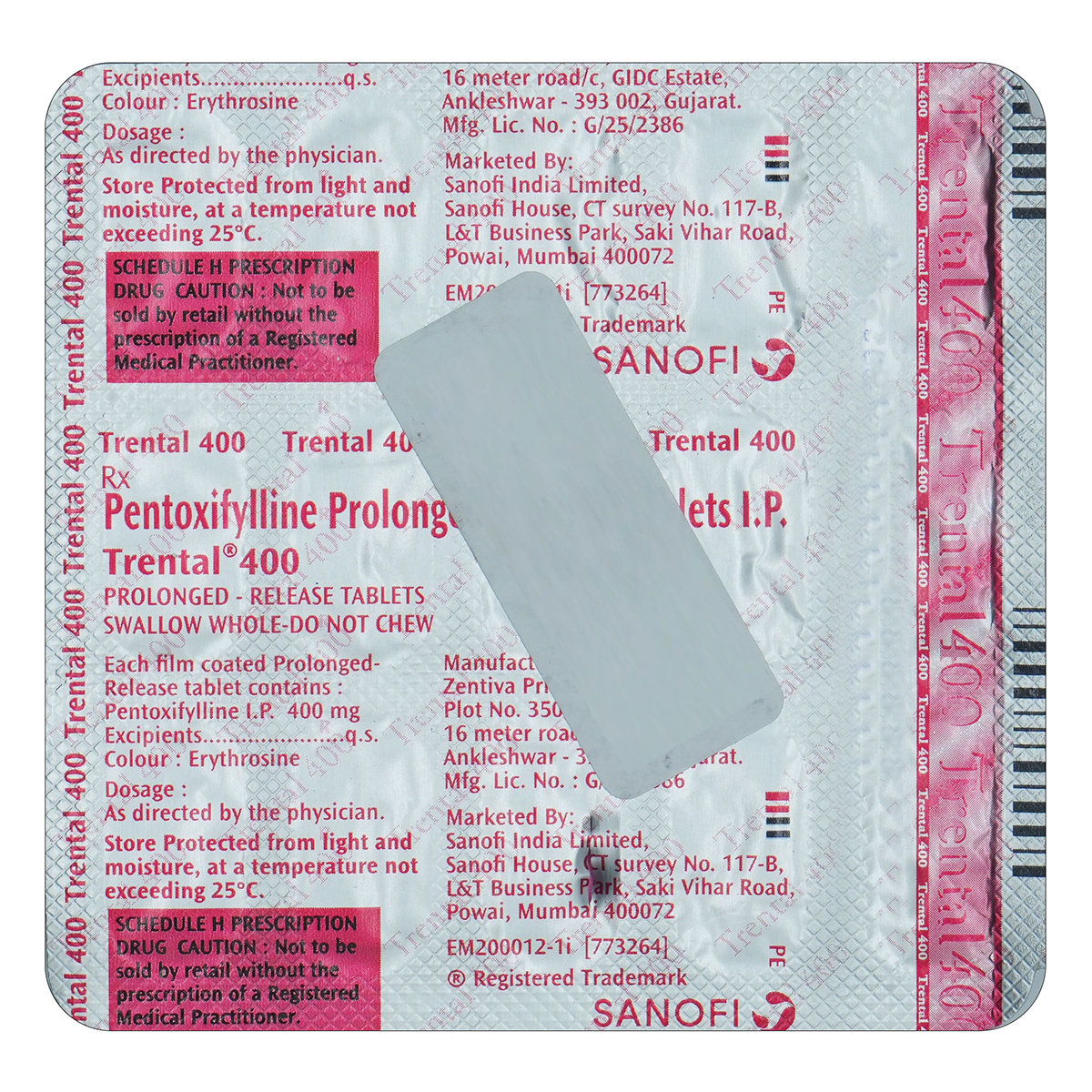Perital 400 mg Tablet 10's
MRP ₹98
(Inclusive of all Taxes)
₹14.7 Cashback (15%)
Provide Delivery Location
Online payment accepted
 Prescription drug
Prescription drugWhats That
Composition :
Manufacturer/Marketer :
Consume Type :
Expires on or after :
Return Policy :
About Perital 400 mg Tablet
Perital 400 mg Tablet belongs to a class of medicines called Hemorrheologic agents (affects blood viscosity), primarily used to treat pain in the legs due to insufficient blood flow (intermittent claudication). It also reduces cramping, numbness, or weakness in the legs on walking in such patients. Intermittent claudication is a peripheral vascular disease in which you have cramp-like pain in your legs when you walk and is caused by an insufficient blood supply in your legs.
Perital 400 mg Tablet works by decreasing the viscosity (thickness) of blood, allowing it to pass more easily through the blood vessels, especially in the small blood vessels of the hands and feet. It can also increase the distance you can walk without pain since it improves your legs' blood circulation. It is recommended in patients whose pain has not improved even after lifestyle changes like quitting smoking and doing regular exercise.
Perital 400 mg Tablet should be taken regularly in dose and duration as advised by the doctor. Your doctor will advise you on the exact dosage and how often you have to take Perital 400 mg Tablet based on your medical condition. You may experience nausea, vomiting, diarrhoea, headache, lightheadedness, sleep problems, intrahepatic cholestasis (removal of bile from the liver is blocked), abdomen pain, constipation, and urine discolouration in some cases. Most of these side effects of Perital 400 mg Tablet do not require medical attention and gradually resolve over time. However, if the side effects are persistent, reach out to your doctor.
Perital 400 mg Tablet should not be stopped abruptly without consulting the doctor as it may lead to unpleasant side effects. Inform your doctor before starting Perital 400 mg Tablet if you have any kidney or liver disease or plan to become pregnant, or are breastfeeding. Also, lifestyle changes should be continued with Perital 400 mg Tablet for best results. Do not take Perital 400 mg Tablet if you ever had bleeding in your brain or the retina of your eyes, heart failure, chest pain, heart disease, and blood pressure.
Uses of Perital 400 mg Tablet
Directions for Use
Key Benefits
Perital 400 mg Tablet contains 'Pentoxyfilline', which is a peripheral vasodilator that works by decreasing the viscosity (thickness) of blood, allowing it to pass more easily through the blood vessels, especially in the small blood vessels of the hands and feet. It can also increase the distance you can walk without pain since it improves your legs' blood circulation. It is recommended in patients whose pain has not improved even after lifestyle changes like quitting smoking and doing regular exercise.
Storage
- Reduce salt intake to minimize fluid buildup.
- Use compression stockings, sleeves, or gloves.
- Gently massage the affected area towards the heart.
- Protect the swollen area from injury and keep it clean.
- Use lotion or cream to keep the skin moisturized.
Drug Warnings
Do not take Perital 400 mg Tablet if you are allergic to any of its components. Inform your doctor if you are pregnant or breastfeeding. Before taking Perital 400 mg Tablet , please tell your doctor if you are using any blood thinners, as it can increase the risk of severe bleeding. Perital 400 mg Tablet is not intended for prolonged use unless prescribed by a physician. Inform your doctor if have had any type of bleeding in your brain or the retina of your eyes, have low blood pressure (less than 90 mm of Hg), or have had a heart attack, kidney disease, or liver disease. Tell your doctor that you are using Perital 400 mg Tablet before undergoing any dental or other surgery. Your doctor might stop this medicine before the surgery. Perital 400 mg Tablet should not be stopped abruptly without consulting the doctor as it may lead to unpleasant side effects. Also, lifestyle changes should be continued with Perital 400 mg Tablet for best results and a speedy recovery.
Drug-Drug Interactions
Drug-Drug Interactions
Login/Sign Up
Taking Ketorolac with Perital 400 mg Tablet can increase the risk of bleeding.
How to manage the interaction:
Taking Perital 400 mg Tablet with Ketorolac is not recommended, but can be taken together if prescribed by a doctor. However, if you experience dizziness, lightheadedness, red or black tarry stools, coughing up or vomiting fresh or dried blood that looks like coffee grounds, severe headache, and weakness contact you doctor immediately. Do not discontinue any medications without consulting a doctor.
Drug-Food Interactions
Drug-Food Interactions
Login/Sign Up
Diet & Lifestyle Advise
- Opt for a diet rich in whole grains, fruits, veggies, and low-fat dairy products.
- Lsodium chloride (table salt) intake alt) in your daily diet.
- Quitting smoking is the best strategy to lower the risk of heart disease.
- Avoid chronic stress. Try to enjoy and spend time with your loved ones to cope with stress and practice mindfulness techniques.
- Try to include heart-healthy omega-3 fatty acid-containing food drinks in your daily diet. You can also use low-fat cooking oil like olive oil, soybean oil, canola oil, and coconut oil to lower your elevated blood pressure.
Side Effects of Perital 400 mg Tablet
- Nausea
- Vomiting
- Diarrhoea
- Headache
- Lightheadedness
- Sleep problems
- Intrahepatic cholestasis (removal of bile from the liver is blocked)
- Abdomen pain
- Constipation
- Urine discolouration
Habit Forming
Therapeutic Class
All Substitutes & Brand Comparisons
RX
Out of StockKinetal 400mg Tablet
Cipla Ltd
₹27.97
(₹2.52 per unit)
71% CHEAPERRX
Trental 400 Tablet 15's
Sanofi India Ltd
₹77.5
(₹4.65 per unit)
47% CHEAPERRX
Cabaza 400 mg Tablet 10's
Jolly Healthcare
₹105
(₹9.45 per unit)
7% COSTLIER
Author Details
We provide you with authentic, trustworthy and relevant information
Drug-Diseases Interactions
Drug-Diseases Interactions
Login/Sign Up
FAQs
Drug-Drug Interactions Checker List
- WARFARIN
- CLOPIDOGREL
- ASPIRIN
- CIPROFLOXACIN
- KETOROLAC
- DICLOFENAC
- INDOMETHACIN
- METOPROLOL
- ATENOLOL
- PROPRANOLOL
- PRAZOSIN
- METFORMIN
- LINAGLIPTIN
- SAXAGLIPTIN
- SITAGLIPTIN
- CANAGLIFLOZIN
- THEOPHYLLINE
- FUROSEMIDE
- CHLOROTHIAZIDE
- INDAPAMIDE
- METOLAZONE
Special Advise
Your doctor may advice you to get regular blood tests done to monitor liver function while taking Perital 400 mg Tablet as it might cause liver injury.
Disease/Condition Glossary
Intermittent claudication: It is a peripheral vascular disease in which you have cramp-like pain in your legs when you walk and is caused by an insufficient blood supply in your legs.

Have a query?
Alcohol
Safe if prescribed
Avoid consumption of alcohol with Perital 400 mg Tablet as it may increase adverse effects such as dizziness, fainting, light-headedness or headache.
Pregnancy
Consult your doctor
Perital 400 mg Tablet is a Category C pregnancy drug and is given to pregnant women only if the doctor thinks the benefits outweigh the risks. Please consult a doctor if you are pregnant.
Breast Feeding
Consult your doctor
Perital 400 mg Tablet is not recommended for breastfeeding mothers as it may harm the baby.
Driving
Safe if prescribed
Drive with caution, Perital 400 mg Tablet may cause blurry vision, and dizziness or weariness.
Liver
Consult your doctor
Perital 400 mg Tablet to be taken with caution, especially if you have a history of liver diseases/conditions. The dose may have to be adjusted by your doctor.
Kidney
Consult your doctor
Perital 400 mg Tablet to be taken with caution, especially if you have a history of kidney diseases/conditions. The dose may have to be adjusted by your doctor.
Children
Safe if prescribed
Perital 400 mg Tablet is not recommended for children. The safety and effectiveness of Perital 400 mg Tablet have not been established in children.










